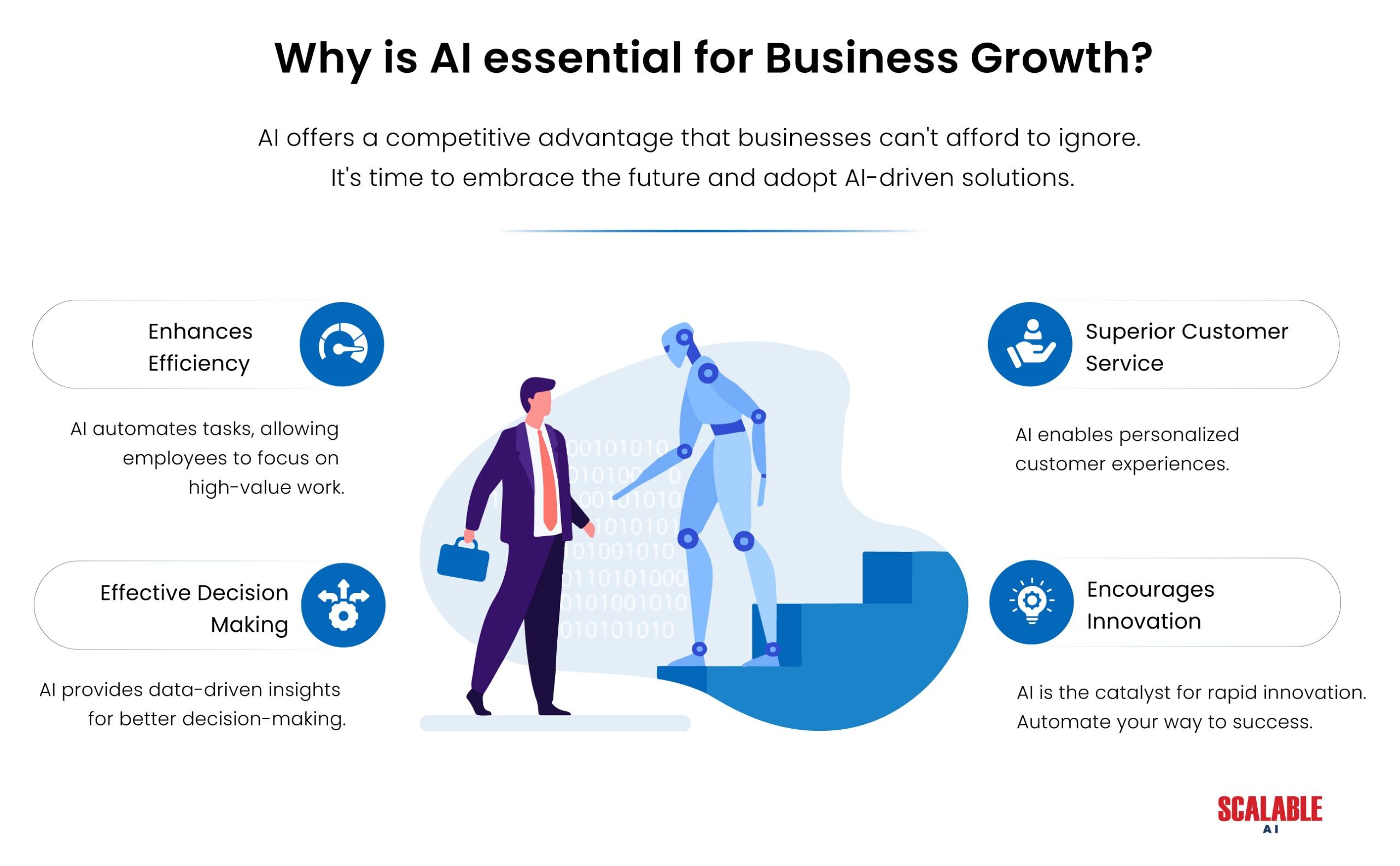Executive Summary:
In the rush to embrace Artificial Intelligence (AI), businesses face a myriad of challenges that can impede their transformation journey. While AI promises to revolutionize operations and drive growth, its adoption requires careful consideration and strategic planning. From addressing skill shortages to navigating data quality issues and integrating with legacy systems, organizations must overcome various hurdles to unlock AI’s full potential. Our assessment offers a comprehensive evaluation of AI readiness, empowering businesses to identify gaps and chart a clear path for successful implementation.
Understanding the Impacts and Preparing for Adoption
Businesses across industries are scrambling to harness the power of Artificial Intelligence – automating tasks, supercharging decision-making, and unlocking a competitive edge. But before diving headfirst into the AI pool, it’s crucial to acknowledge the ripples it creates. While household names like Siri and Alexa showcase AI’s everyday impact, the recent buzz around generative AI is blowing minds – churning out stunning text, graphics, and videos in seconds has businesses salivating at the possibilities. A Forbes survey even found that a whopping 97% of business owners believe ChatGPT can benefit their ventures. Yet, wielding such power requires a clear understanding of AI’s potential pitfalls and a well-defined strategy for adoption.
Assessing AI Readiness of Organization
Agility is a prime aspect in today’s business world. Artificial Intelligence (AI) emerges as the potent engine propelling organizations beyond mere survival, propelling them towards flourishing in this ever-evolving ecosystem. It offers unparalleled opportunities for organizations to adapt, innovate, and excel in the dynamic market environment. Discover whether your business is poised to leverage the transformative power of AI with our comprehensive AI readiness assessment. By identifying potential gaps and challenges, you can develop a strategic roadmap for successful AI adoption and implementation, ensuring your organization is well-equipped to thrive in the digital age.
Why AI is Essential for Business Growth
In today’s digital world, using AI isn’t just an option; it’s a must for companies looking to thrive. Here’s why:
Boosts Efficiency:
AI handles repetitive tasks, freeing up time for employees to focus on more important work. This efficiency means getting more done in less time, saving money along the way.
Smart Decision Making:
AI analyzes loads of data quickly, helping businesses make smarter choices. By spotting trends and patterns, it guides decisions that lead to success.

Delivers Better Customer Service:
With AI, companies can personalize experiences for customers. Whether it’s through chatbots or tailored recommendations, AI ensures customers feel valued and heard.
Fuels Innovation:
By automating routine tasks, AI lets companies innovate faster. With more time and resources, they can explore new ideas and stay ahead of the curve.
Navigating the Challenges of AI Adoption
As businesses venture into the realm of AI adoption, they encounter a series of hurdles that require careful navigation:
Expertise and Skill Shortage:
Implementing AI effectively demands specialized knowledge and skills, which many organizations lack. Investing in training and upskilling empowers teams to manage AI technologies proficiently.
Data Quality and Availability:
The success of AI hinges on the quality and availability of data. Poor quality or insufficient data can lead to flawed conclusions and strategies. Ensuring access to high-quality, well-optimized data sets is crucial for building effective AI models.
Integration with Legacy Systems:
Integrating AI with existing legacy systems poses challenges due to compatibility issues. Modernizing systems and adopting flexible operational frameworks streamline the integration process.
Implementation Cost:
The initial costs of AI implementation, including acquiring and training AI models, can be substantial. While daunting, the long-term benefits of AI adoption justify the investment and enhance competitiveness.
Infrastructure Readiness:
Deploying AI requires the right technological infrastructure and architecture. Organizations must ensure they have the necessary support in place to facilitate seamless AI implementation.
Lack of Leadership Ownership:
Leadership ownership and understanding are essential for successful AI adoption. Leaders must grasp the technology’s nuances, potential risks, and ethical considerations to drive effective implementation.
Regulatory and Ethical Concerns:
AI adoption raises ethical and regulatory issues, such as data privacy and bias. Compliance with regulations and ethical data utilization are imperative to mitigate legal risks and maintain customer trust.
Low Expectations on ROI:
Some organizations may underestimate the potential ROI of AI adoption, hindering their ability to harness its benefits fully. Estimating the business value and aligning AI initiatives with strategic objectives are essential for achieving expected ROI.
Navigating AI Adoption Challenges
As organizations embark on the journey of AI adoption, they inevitably face many obstacles. From skill shortages to data quality issues and regulatory concerns, each hurdle presents an opportunity for growth and innovation. By addressing these challenges head-on and implementing robust strategies for AI adoption, organizations can unlock the transformative power of AI and position themselves for success in the digital age. With the right approach and mindset, businesses can navigate the complexities of AI adoption and emerge stronger, more agile, and better equipped.
Read Whitepaper From Silos to Synergy: Building a Smarter Organization
